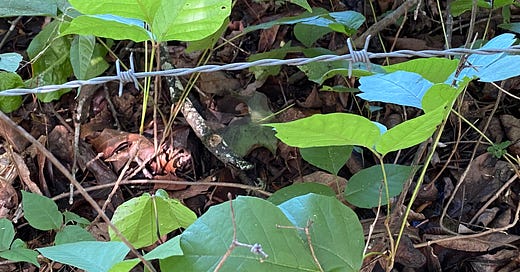Every time I walk this land, I find more signs of those who lived here before me. There are charming ones like the rusted-out stills in the woods, and puzzling ones like the spiral stone circles that could be hundreds of years old or thousands. Then there are the ugly ones like the rectangular catfish pond dug by the owner before me, who gave up when Great Blue Herons kept beating him to the fish. I won't tell you what he did to deter the herons first, but the tractor-built pond remains, home to nothing but snapping turtles now.
The barbed wire was no surprise when Ed and I bought the place in 1994. It was a cow pasture then, and the hilly, wooded terrain made any other kind of fencing impractical, both in function and expense. Once we had walked the new boundaries with the seller, he installed a half-mile more of it to keep the cows off their old grazing ground, causing them to moo mournfully as they stood on the other side, wondering what had gone wrong.
The new wire may have been bad, but the old wire was worse. I found it hidden under bowers of blackberry bushes in the summertime, and wrapped around fallen trees in the wintertime. I traced the ghost boundary of an old pasture inside a newer one by following the clipped strands of wire embedded in trees that had taken the metal into their bodies but could not get it out. Sometimes, when I lost the trail, I found it again by stepping on a barb or tripping over wire buried in the leaves underfoot.
The first time I tackled the wire, I learned that 1) special gloves, arm covers, and chaps were necessary to prevent puncture wounds, and 2) ordinary wire cutters were inadequate for a twisted strand of low-carbon steel with twelve barbs per foot. After I returned from the hardware store with the requisite clothing and cutters, I discovered that the wire had a nasty habit of springing back at me once released from whatever it was nailed, stapled, or fastened to. I quickly learned to treat it like a surprised snake and leap back when I cut it, before dragging it out of the brush that had grown over it through the years. There was no Google back then to tell me I should have gotten a new tetanus shot, yet here I am to tell the tale.
Unlike the stone circles on the land, it is possible to date barbed wire, which had six different patents filed on it in 1867. At least half of the registrants were midwestern farmers who needed an affordable way to contain their livestock or keep other people's animals out of their crops. Within fifty years, the popular new method of fencing had caused the death of hundreds of thousands of free-ranging cattle in the Great Plains, provoked fence-cutting wars in the Old American West, and proved useful in two World Wars, protecting soldiers in trenches during the first one and confining prisoners in death or internment camps during the second. As recently as 1968, barbed wire panels were fastened to the fronts of military police jeeps in Chicago and used to quell riots over the Vietnam War, the assassination of Martin Luther King Jr., and the meeting of the Democratic National Convention.
I remember all of this when I am doing what I can, which is to remove the barbed wire where I live. You may take this literally or metaphorically, since it works either way. It's small stuff, this local purge, but having some flesh in the game helps for some reason. The work is sweaty and painful, but never lonely. Every time a barb in the devil wire draws blood, I imagine a crowd of witnesses gathering—and every time I deliver a coil of rusty thorns to the metal recycling center, they give a little shout.





Wow, this one really hit me hard for some reason. Thanks for it, Barbara. There is a particular sorrow in pulling barbed wire from the earth… not just the labor of it, the blood drawn by rusted thorns, but the weight of all it has held back, all it has wounded. This land remembers. The trees have swallowed strands of it, as if trying to digest what men left behind. The wire does not belong here, yet it persists, a relic of old violences: the herons driven off, the cows bewildered at their new boundaries, the trenches and camps where it was twisted into instruments of suffering.
We are always fencing something in or out it seems. Livestock, enemies, our own restless hearts. The wire is a confession: we would rather lacerate than trust. And now it lies half-buried, a rusting snare for the unwary, as though the earth itself is reluctant to let go of our cruelty.
To pull it up, coil by coil, is a small penance. The work is lonely until you feel the ghosts gathering, not just the herons and the cattle, but the prisoners, the rioters, the ones who learned too late how sharp a line can be. The wire cutters in your hands are a feeble redemption, but they are something. You cannot undo the past, only wrestle with its remnants, and hope the land, in time, will forget what we have done to it.
Thank you, Barbara.
Grace, Beauty, and Wisdom to you.